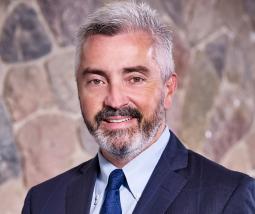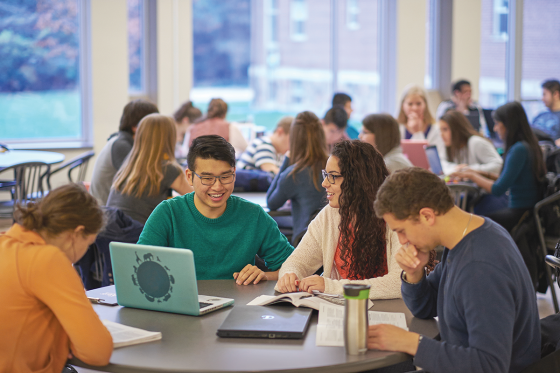
Events

Here, inspired by his students’ “enthusiasm for the truth”, Fr. Louis Funcken laid the foundation for St. Jerome’s University with his plans for a college program that combined service to others with the rigorous academic study and critical inquiry that are hallmarks of the Catholic Intellectual and Liberal Arts Traditions.
Federation to the new University of Waterloo, followed by the arrival of the School Sisters of Notre Dame added to this a powerful commitment to the higher education of women and helped to refine the University’s mission commitment to learning and academic excellence, to the Gospel values of love, truth, and social justice and to the formation of leaders for service to the community and the Church. It is a mission that has now left its mark on generations of St. Jerome’s graduates.
Grounded on the firm foundation of this mission, and on the importance of planning and preparation, St. Jerome’s now looks to its future. This Strategic Plan, which will guide us in an age of many uncertainties, asks us to consider the importance of change as it will be essential to defining how St. Jerome’s will be a Catholic university. Our students today grapple with many of the challenges of social injustice left to them by previous generations, including the increasing gap between rich and poor, the importance of equity, diversity and inclusion, justice and reconciliation for Indigenous people, and sustainability and its implications for the very future of our planet.
They are in search of authenticity and community, and of something to believe in and to be a part of in a time characterized by self-interest, polarizing political divisions, and an endemic distrust of leaders and institutions. If we are to serve our mission today, we must do so with an openness to meeting our students ‘where they are’. To this end, we can take inspiration from the Church’s emphasis on Synodality - the process of walking together rooted in the spirit of the Second Vatican Council. This calls on us to see the importance of encounter and dialogue to making changes that will be meaningful and lasting. 
In this way, we are committed to Integral Human Development (IHD), an important aspect of Catholic social doctrine focused on preparing leaders who are conscious of the diversity, complexity and richness of the human experience and are formed here to contribute thoughtfully, creatively and positively to the common good of society. IHD also emphasizes how we relate to and think about others, rooted in the importance of vocation - the understanding that each of us has a calling, which attaches meaning and purpose to what we do.
IHD underlines the importance of the goal resting at the very centre of this Strategic Plan, our desire to become Canada’s premier Catholic undergraduate university. In this way we know that we bring to our valued federation to the University of Waterloo the desire not to ‘fit in’ but to ‘stand out’ by understanding the importance of education and human formation together, we seek to bring a Catholic-Christian view of human anthropology to our students, regardless of their background, that emphasizes the importance of their education in the context of a world that desperately needs leaders of vision, conscience and service.
The plan’s first priority underlines St. Jerome’s reason for being – its Catholic mission and identity. St. John Henry Cardinal Newman declared the proper work of a university was to “prepare people of the world, for the world.” For Catholic universities this has always meant attending to the needs of the ‘whole person’ through education and formation. As a model for Catholic universities and colleges that exist in federated or affiliated relationships with public university partners, we seek to bring the best of this mission and identity to the life of the University of Waterloo. In this context, St. Jerome’s will not define itself by the number of Catholics we count among our faculty, staff and students, but we will be a university that is animated and informed by a living Catholic tradition and a mission that is shared in by all members of its community, regardless of their religious or non-religious beliefs.

Our desire to foster an outstanding culture of research and learning is also connected to our commitment to advancing the common good of society. We seek to do this by nurturing a scholarly community that will bring thought leadership to addressing the challenges of the times, and by educating and forming students to become leaders of conscience who will think critically and act ethically. In keeping with our commitment to students as ‘whole persons’, we emphasize the importance of learning as a complex phenomenon that also takes place in our programs of service and experiential learning, in academic advising and counselling, in campus ministry, in our residence life, and in the other forms of community we celebrate here. Motivated by the pursuit of truth that is fundamental to the Catholic Intellectual Tradition, and by our confidence in the compatibility of faith and reason, the “two wings on which the spirit rises to contemplation of the truth” (Fides et ratio, 1998), St. Jerome’s is committed to freedom of expression and to the protection of academic freedom. Academic freedom also has a special importance for our Catholic character and identity, which demands that we support our faculty in their “lawful freedom of enquiry and of thought, and of freedom to express their minds humbly and courageously about those matters in which they enjoy competence” (Ex corde Ecclesia, 1991).
Building an equitable, diverse, inclusive and just community is a natural expression of St. Jerome’s mission identity. Essential to this is the understanding that “God is no respecter of persons” (Acts 10:34) and that every human being possesses an inalienable dignity that must be respected regardless of our diversities. We are committed to the importance of dialogue and to creating what Pope Francis has referred to as a “culture of encounter” to overcome the blindness that has allowed structural barriers to full inclusion in our community, and to our responsibility as a Catholic university to Reconciliation with Indigenous people. Aligned with our commitment to the education and formation of leaders, we see the ideal community as a place that nurtures and attends to the intellectual development of students, as well as to their physical, mental and spiritual health. In this way we will create opportunities for students to “learn to be themselves without constraint,” and thereby to discover their calling and purpose. For young people at the start of their life journeys, these underscore the difference between making a living and making a life. St. Jerome’s

Peter Meehan
President and Vice Chancellor